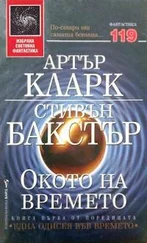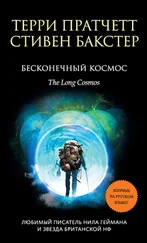But there was also, he was told, good science to be done here.
Not that he gave a shit about that.
He was only here, tinkering with plumbing and goddamn pea plants, because nobody else in the Office had wanted to be distracted from the competition for places on the Mars flights to come.
The angle of the sun was changing, and the slanting light changed Ra from a flat silhouette to a potato-shaped rock in space, fat and solid. Ra's surface was crumpled, split by ravines, punctured by craters of all sizes. There was one big baby that must have been a kilometre across, its walls spreading around the cramped horizon.
The rock was more than three kilometres long, spinning on its axis once every twenty hours. It was as black as coal dust. Ra-Shalom was a C-type asteroid - carbonaceous, fat with light elements, coated by carbon deposits. It had probably formed at the chilly outer rim of the asteroid belt. Ra was like a folded-over chunk of the Moon, its beat-up surface a record of this little body's dismal, violent history.
At a computer prompt, he prepared for his final burn. 'Ready for Terminal Initiation.'
'Copy that, Oliver.'
One last time the kerosene thrusters fired, fat and full. 'Okay, EVI, Ehricke. Coming up to your hundred-metre limit.' 'Copy that.'
He came to a dead stop, a hundred metres from the surface of Ra-Shalom. The asteroid's complex, battered surface was like a wall in front of him. He felt no tug of gravity - Ra's G was less than a thousandth of Earth's - it would take him more than two minutes to fall in to the surface from here, compared to a few seconds on Earth.
He was comfortable. The suit was quiet, warm, safe. He could hear the whir of his backpack's twenty-thousand rpm fan. But he missed the squeaks and pops on the radio which he got used to in LEO as he drifted over UHF stations on the ground.
He blipped his cold-gas thrusters, and drifted forward. This wasn't like coming in for a landing; it was more like walking towards a cliff face, which bulged gently out at him, its coal-like blackness oppressive. He made out more detail, craters overlaid on craters down to the limit of visibility.
He tweaked his trajectory once more, until he was heading for the centre of a big crater, away from any sharp-edged crater walls or boulder fields. Then he just let himself drift in, at a metre a second. If he used the thrusters any more he risked raising dust clouds that wouldn't settle. There were four little landing legs at the corners of his frame; they popped out now, little spear-shaped penetrators designed to dig into the surface and hold him there.
The close horizon receded, and the cliff face turned into a wall that cut off half the universe.
He collided softly with Ra-Shalom.
The landing legs, throwing up dust, dug into the regolith with a grind that carried through the PMU structure. The dust hung about him. Greenberg was stuck here, clinging to the wall inside his PMU frame like a mountaineer to a rock face.
He turned on his helmet lamp. Impact glass glimmered.
Unexpectedly, wonder pricked him. Here was the primordial skin of Ra-Shalom, as old as the solar system, just centimetres before his face. He reached out and pushed his gloved hand into the surface, a monkey paw probing.
The surface was thick with regolith: a fine rock flour, littered with glassy agglutinates, asteroid rock shattered by aeons of bombardment. His fingers went in easily enough for a few centimetres - he could feel the stuff crunching under his pressure, as if he was digging into compacted snow - but then he came up against much more densely packed material, tamped down by the endless impacts.
He closed his fist and pulled out his hand. A cloud of dust came with it, gushing into his face like a hail of meteorites. He looked at the material he'd dug out. There were a few bigger grains here, he saw: it was breccia, bits of rock smashed up in multiple impacts, welded back together by impact glass. There was no gravity to speak of; the smallest movement sent the fragments drifting out of his palm.
His glove, pristine white a moment ago, was already caked black with dust. He knew the blackness came from carbon-rich compounds. There were hydrates too: water, locked up in the rock, just drifting around out here. In fact rocks like Ra were the only significant water deposits between Earth and Mars. It might prove possible to use the rock's resources to close the loops of mass and energy circulating in Ehricke's life support, even on this preliminary jaunt.
Ra could probably even support some kind of colony, off in the future. So it was said.
Greenberg had always preferred to leave the sci-fi stuff to the wackos in the fringe study groups in NASA, and focus on his checklist. Still, it was a nice thought.
He allowed himself a moment to savour this triumph. Maybe he would never get' to Mars. But he was, after all, the first
human to touch the surface of another world since Apollo 17.
He pushed his hand back into the pit he'd dug, ignoring the fresh dust he raised.
The cloud was scattered, thin and dark, across ten light years. It was gas laced with dust grains - three-quarters hydrogen, the rest helium, some trace elements - visible only to any observers as a shadow against the stars.
When the supernova's gale of heavy particles washed over it, the cloud's stability was lost. It began to fall in on itself.
In a ghostly inverse of the inciting supernova explosion, the core of the cloud heated up as material rained in upon it, its rotation speeding up, an increasingly powerful electromagnetic field whipping through the outer debris. The core began to glow, first at infra-red wavelengths, and then in visible light.
It was the first sunlight.
Scale: Exp 2
Oliver Greenberg was bored.
He was actually glad to get the call from Gita Weissman about the balky rock splitter in Shaft Seven, even though the lost time would mean they weren't going to make quota this month.
At least it made a change from the usual CELSS problems, CELSS for closed environment and life-support systems, a term nobody used except him any more. Even after a century, nobody had persuaded a pea plant to grow nice straight roots in micro-gravity, and the loss from the mass loops in the hydroponic tanks continued at a stubborn couple of per cent a month, despite the new generation of supercritical water oxidizers they used to reduce their solid wastes.
It's still about pea plants and plumbing, he thought dismally.
He started clambering into his skinsuit, hauling the heavy fabric over his useless legs.
He took a last glance around the glass-wall displays of his hab module. It shocked him when the displays showed him he was the only one of Ra's two thousand inhabitants on the surface.
Well, hell, it suited him out here, even if it had stranded him in this lonely assignment, monitoring the systems that watched near-Ra space. Most of the inhabitants of Ra had been born up here, and lived their lives encased in the fused-regolith walls of old mine shafts. They didn't know any better.
Greenberg, though, preferred to keep a weather eye on the stars, unchanged since his Iowa boyhood. He even liked seeing Earth swim past on its infrequent close approaches, like a blue liner on a black ocean, approaching and receding. It made him nostalgic. Even if he couldn't go home any more.
Suited up, he shut down the glass-wall displays. The drab green walls of the hab module were revealed, with their equipment racks and antique bathroom and galley equipment and clumsy-looking up-down visual cues. This was just an old Space Station module, dragged out here and stuck to the surface of Ra-Shalom, covered over with a couple of metres of regolith. He was tethered in the rim shadow of Helin Crater, the place he'd landed on that first jaunt in the Ehricke. And that had been all of a hundred years ago, my God.
Читать дальше
Конец ознакомительного отрывка
Купить книгу
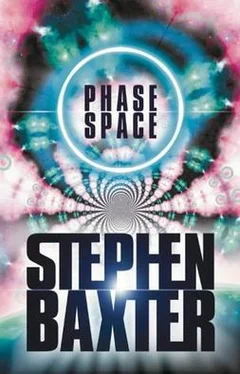
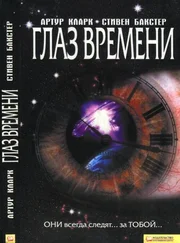

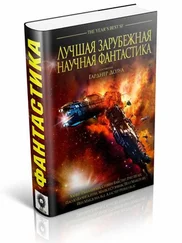
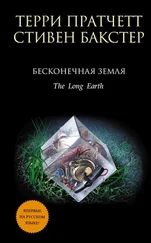
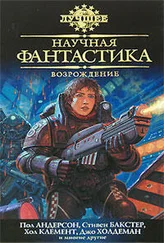
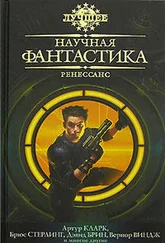

![Стивен Бакстер - Бесконечный Космос [litres]](/books/415680/stiven-bakster-beskonechnyj-kosmos-litres-thumb.webp)
